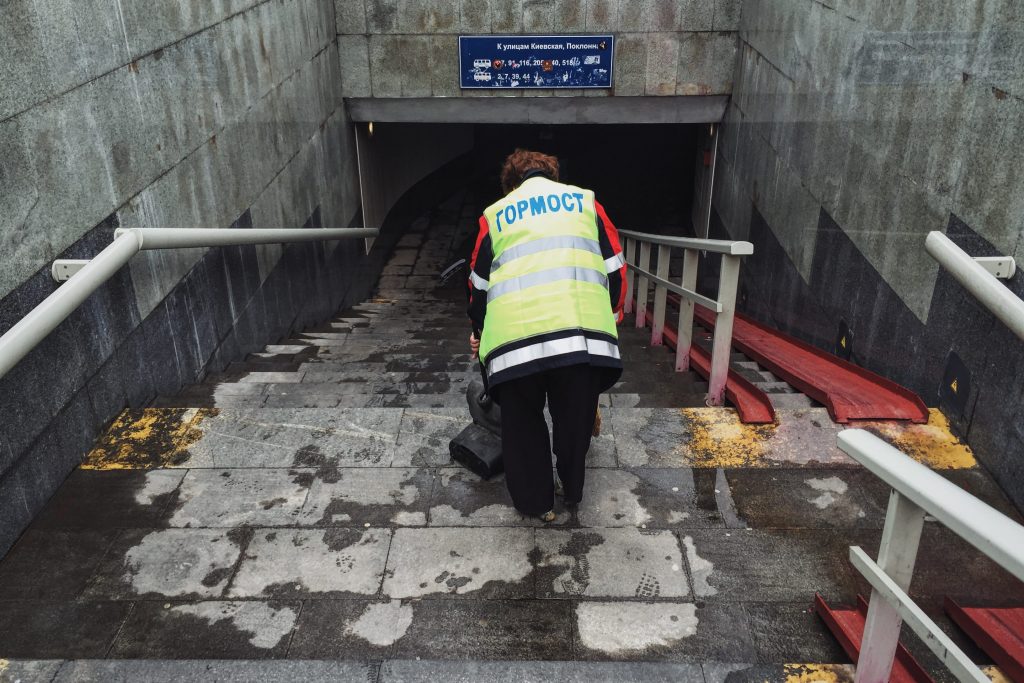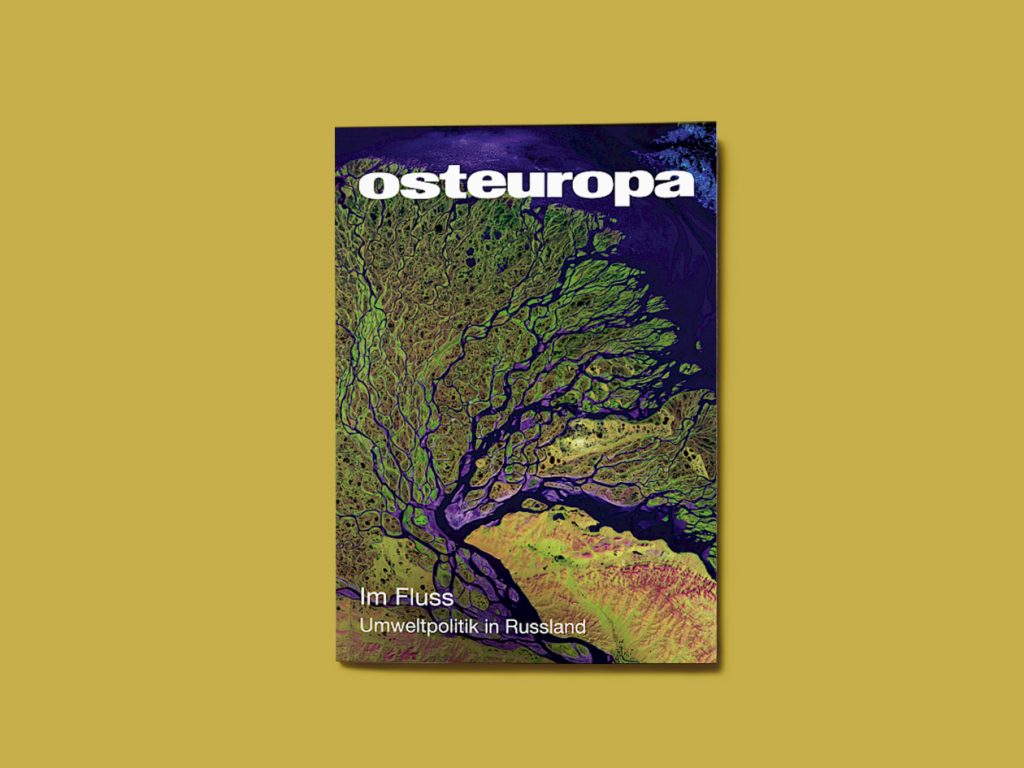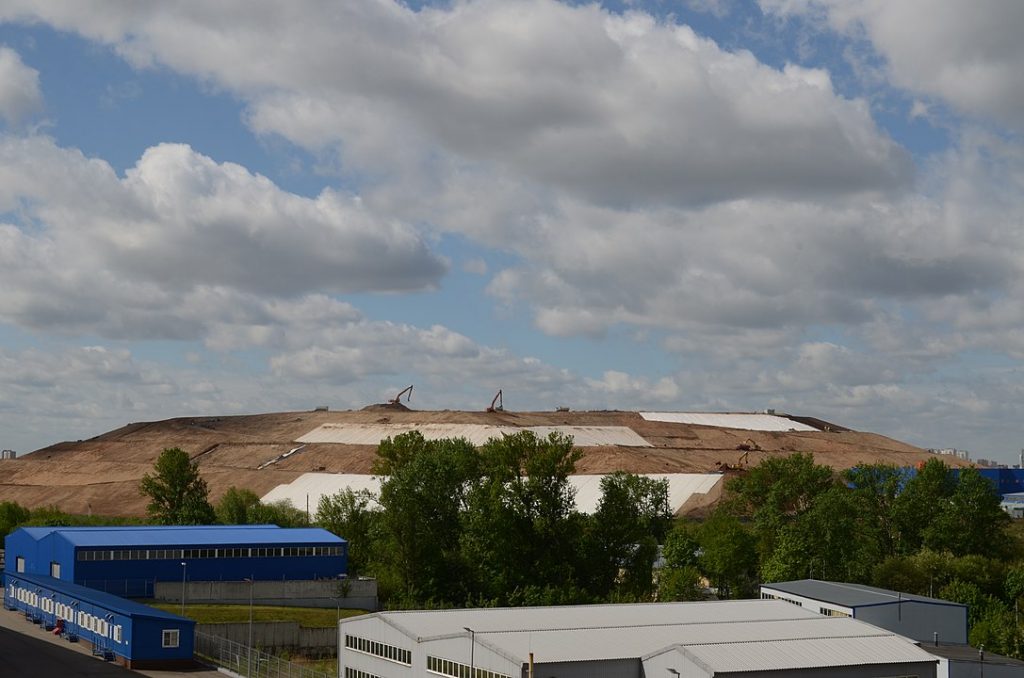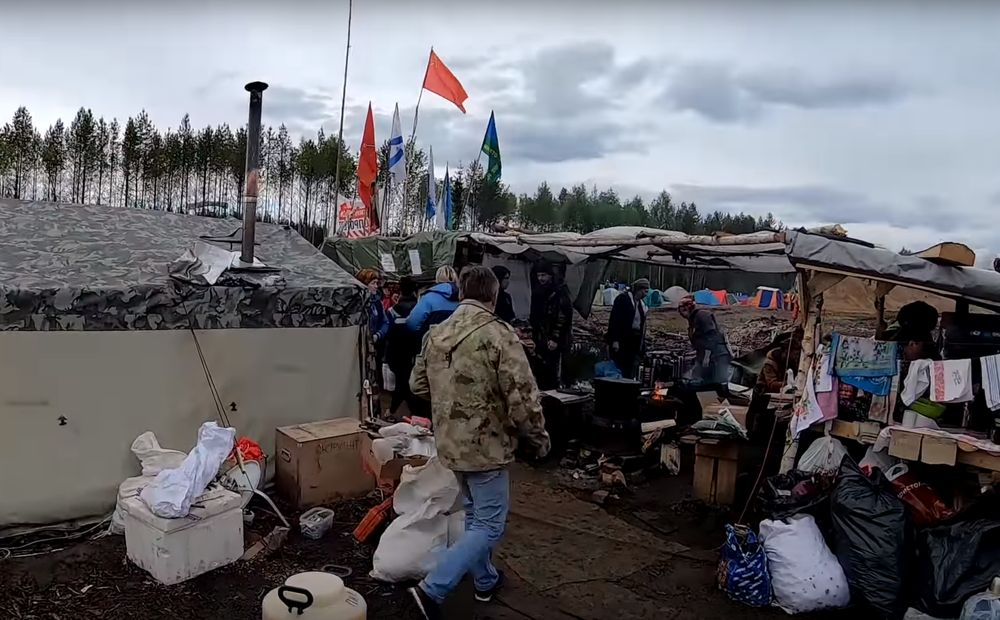‘The garbage has reached Putin: the president demanded an immediate solution to the “dirty” problem. The regional issue of dumps unexpectedly became political.’ Moskovskii Komsomolets, 2017
In recent years dissatisfaction with the handling of solid waste in Russia has reached boiling point. In 2018, long-simmering resentment in the Moscow Oblast’ at being the ‘capital’s garbage dump’ turned to outrage. But when Moscow authorities attempted to divert some garbage away from the region, they triggered protests elsewhere. President Putin then established a national waste-processing system supervised by the federal government, a programme it referred to as the ‘garbage revolution’. But as on previous occasions in Russian history, this revolution was top down.
Judged against John Dewey’s criterion for determining the effectiveness of a state – ‘the degree of organization of the public which is attained, and the degree in which its officers are so constituted as to perform their function of caring for public interests’ – this ‘system’ reveals the fundamental shortcomings of Putinism.
Dealing with garbage in an ecologically sound manner, while not imposing an excessive economic burden or triggering political discontent, is certainly a very difficult task. Nevertheless, it seems that some of the problems in Russia have been due to, or exacerbated by, the country’s ‘power vertical’, which typically responds to citizens only when they protest decisions that have already been made.
Protests in Russia are more likely to be based on shared understandings of justice/injustice than on abstract conceptions of rights. In Russia, as elsewhere, the siting of ‘divisive facilities’ frequently is based on expediency, rather than justice; and garbage processing plants often are located where local populations are relatively ill-equipped to resist. For example, Moscow residents successfully resisted construction of new garbage-incineration plants, while Moscow Oblast’ residents ended up next door to dumps, thanks to decisions taken by ‘cronies’ behind closed doors.
The authorities were not concerned about justice, but for citizens it was the fundamental issue. A strong sense of injustice, which sprang from situations where citizens had no say in decisions that drastically affected their quality of life, resonated throughout the country, turning local protests into a national ‘garbage crisis’.

Moscow 2016. Image: Gennady Grachev. Source: Wikipedia
Waste management after communism
In the USSR, garbage was unsystematically deposited in dumps before the war, and later buried in designated landfills. The Soviet government established a recycling program in big cities; by 1989 it accounted for 25 per cent of household solid waste. Households mainly turned in paper and glass containers; there was no plastic or aluminium packaging, and ‘tin’ cans were rare. However, the recycling system did not outlast the USSR. When Gorbachev opened the door to western consumer goods in the late eighties, the country was inundated with garbage. Much of it consisted of previously unseen materials such as polyethylene and polystyrene foam.
Local authorities were untethered from the Kremlin to an unprecedented degree, and often they busied themselves by maximizing ill-gotten gains. Huge dumps appeared that were run by criminals. A licensing system was implemented, but it just managed to shroud the situation with a thin veil of legality; the ‘bandits’ controlling the dumps became ‘kings,’ in other words legalized monopolists. Russia of course is not the only country where waste management practices have been controlled by criminal enterprises. But the national scope and legalistic veneer of the ‘system’ appear to have been exceptional.
The authorities’ preferred method of dealing with citizens’ wastes has been incineration. The first garbage-incineration plant in the USSR appeared in Moscow in 1979. Three more were built subsequently, although one used to eliminate biological wastes was closed by in 2014 after the mayor, Sergey Sobyanin, received a petition with 10,000 residents’ signatures. Following reconstruction of two plants, the remaining three incinerators are supposed to adhere to European standards when operated properly, which depends on sorting the wastes before incineration. But this is not always done. Although the city claims the plants are safe, public confidence was undermined when the newest plant was filmed spewing purple smoke.
The leading alternative to incineration is recycling, which has been discussed in Russia for many years; yet, in 2019 only about four per cent of household wastes were recycled. Moscow, often the country’s trendsetter, has only recently succeeded in establishing recycling. The city government failed to follow through on several recycling initiatives and, to be fair, ordinary citizens in general have declined to cooperate.
The city government established a pilot recycling station in 2000, but ‘public consciousness’ was insufficient. In 2004 a ‘Clean Moscow’ campaign failed because recycling infrastructure and funding were lacking. In 2012 Moscow launched a pilot recycling program in the southwest district, expanding it to five more districts the following year. But newly purchased recycling technology was used merely to compress garbage and reduce shipping costs. By 2015 the city had set up 300 waste-recycling stations, but few residents sorted their trash. The city initiated a ‘Sort and Use’ campaign involving 70 mobile sorting stations, but Greenpeace found that only 4–5% of Moscow’s domestic waste was being recycled.
The city redoubled its efforts in 2018 by placing 500 waste-sorting bins in parks and near public transportation stops. The following year all Moscow courtyards were provided with trash-sorting collection points. The capital set the standard for the country; the number of Russians with access to trash sorting facilities reached 27 million in 2020. However, case studies elsewhere show that even partial success takes time and a sustained effort. The Kremlin, in contrast, evidently wants the garbage crisis resolved – i.e., eliminated as a national political issue – as soon as possible. In December 2019, first Moscow and then the Kremlin ruled that trash incinerated to produce heat or electricity would count as ‘recycled’.

This article was among the selection of articles on environmentalism in Russia published in German in Osteuropa 7–9/2020. Read a review of the issue here.
Scandal in the oblast’
Landfills and unsanctioned dumps provoked protests in the Moscow oblast’ for years before receiving national attention. By the 2000s Moscow was dumping more garbage in the oblast’ than the latter produced itself. In 2000, there were 50 registered landfills, which on average were 80 per cent full, along with about 1500 illegal dumps. Aggrieved citizens sought justice through ‘official channels’ to no avail. For instance, the village of Torbeyevo had a garbage pile 15 stories high in 2011; its leachate contaminated their wells. Residents had been beseeching officials to close the dump for a decade.
In 2013 an independent Russian environmental organization, ‘Green Patrol,’ ranked Moscow Oblast’s ecological health as 79th among Russia’s 83 regions. The oblast’ ranked first in complaints about environmental abuses, a harbinger of the protest wave to come. Green Patrol labelled the oblast’ ‘the capital’s garbage dump’. One-fifth of all the waste generated in Russia was deposited there.
But it was not just because of the relentless accumulation of solid waste that a tipping point was reached in 2017. Political decisions exacerbated the situation. In 2015 the oblast’s governor, Andrei Vorobyev, ‘reformed’ government to produce his own ‘power vertical’ by incorporating towns into larger districts governed by his appointees. Local officials attempting to represent their constituents faced a unified power structure. Between 2013 and 2017, 24 of the oblast’s 39 legal landfills were closed down, largely because of a struggle to monopolize the lucrative business.
Putin inadvertently made matters worse. During his annual ‘Direct Line’ question-and-answer session with citizens in June 2017, the president responded to oblast’ residents’ complaints by closing the Kuchino landfill. A former quarry, Kuchino began receiving waste in 1964 and had become a twenty-story mountain of garbage. But its precipitous closure radically increased the pressure on the remaining landfills.

Kuchino solid waste landfill, 2020. Photo by Karachun, CC BY-SA 4.0, via Wikimedia Commons
The decisive wave of protests in Moscow Oblast’ began early in 2018. Some 3000 local residents rallied in Kolomna to protest the intensified use of their local landfill, which had been receiving five times its designed capacity for months. Protests soon spread to other oblast’ towns. Residents demanded the closure of local dumps and introduction of recycling programs in both the capital and the oblast’, and they opposed construction of garbage-incineration plants. A demonstration by 5000 people in Volokolamsk on 3 March drew national attention. The protesters demanded the closing of nearby Yardrovo landfill, the stench from which was said to be unbearable, as well as the removal of several officials, including those responsible for issuing false air-pollution readings.
On March 21 pupils at three schools in Volokolamsk complained of dizziness and nausea; 73 were admitted to the local hospital. Residents gathered in an angry protest, which resonated with parents throughout the federation. Protestors physically attacked the district chief, who also was scapegoated by Vorobyev. At the same time, another local boss appealed to Putin, claiming that Vorobyev was behind death threats he had received for supporting the protesters in his district. The bottom rung of the oblast’s ‘power vertical’ was not an enviable position.
Growing national crisis
The protests in Moscow Oblast’ inspired others to take a stand against unsanitary and unsustainable garbage disposal in their regions. Between 1 October 2017 and 1 September 2018, there were at least 44 garbage protests across Russia. Resistance in Moscow Oblast’, meanwhile, forced the capital’s leaders to find other destinations for garbage, which incurred more opposition. Officials in nearby Kaluga Oblast’ were receptive. But to overcome local opposition they had to dismiss a local government and rig new elections. In contrast, Tver’ Oblast’ authorities refused outright to accept Moscow’s garbage.
The most controversial diversion of Moscow’s garbage was meant for a desolate whistle stop over 1100 kilometres to the northeast in Arkhangel Oblast’, which is larger than France but has only 1.1 million residents. In mid-October, Moscow and Arkhangel Oblast’ authorities agreed on a plan to create an ekotekhnopark in Shiyes, a railroad stop which residents had abandoned decades earlier. There was nothing ‘eco’ or ‘techno’ about it; Moscow planned to ship 1.5 million tons of baled garbage annually for burial there. The authorities launched a public relations campaign, promising to improve infrastructure in the oblast’. As the investigative journalist Ivan Golunov revealed, another ‘ekotekhnopark’ was planned for a village ten kilometres from the White Sea.
Residents in the city of Arkhangel’sk were not receptive. It was especially galling that the contaminating waste came from the supercilious, cosmopolitan metropolis. Protests began in October 2018 and continued in March 2020, despite a ruling by the oblast’s arbitration court in January that the landfill was illegal and construction must cease. An unusually intense ‘NIMBY’ reaction, one might think, except for the fact that Shiyes is located 900 kilometres from Arkhangel’sk, not in the city’s ‘backyard.’ The landfill seems to have been ‘the last straw’ for people whose standard of living has been declining, particularly following Putin’s pension ‘reform’ in 2018, which arbitrarily raised retirement ages.

Protest against the landfill at Shiyes, Arkhangel’sk, June 2019. Photo by Тропин Евгений, CC BY-SA 4.0, via Wikimedia Commons
Citizens in many other parts of the country were inspired by the Shiyes protests, not just with respect to garbage, but also because they opposed the authorities’ typical modus operandi. For example, opponents of the Shiyes landfill found common ground with Ingush activists in the North Caucasus, because authorities in both places had imposed projects that seriously affected local people’s lives without consulting them. This attitude that ‘we know what is best for you’ has been provoking grass-roots opposition for years.
When inconsiderate and patronizing treatment of citizens leads to unrest, authorities react by ‘doubling down’ on arrogance. Moscow authorities were determined to proceed with the Shiyes project, specifically to show that they would not be deterred by public opposition. Arkhangel Oblast’s governor called protesters ‘riff-raff,’ which predictably infuriated them and bolstered their resolve. In Shiyes and other places, garbage protesters have been beaten and/or arrested.
Nevertheless, local protests began to coalesce into a movement, one that threatened to ignite other forms of opposition; for example, in the Komi Republic, which experienced a revival of Komi nationalism. And garbage protests continued to spread; 63 occurred in the first quarter of 2019 and 60 more in the second. Under the banner, ‘Russia is not a dump!’, protests took place in February in at least 25 regions, including Kaliningrad, St. Petersburg, Tatarstan, the Kuban region, and Siberia.
Repression could not solve the garbage crisis. Putin himself had made it clear that citizens were justified in protesting garbage situations that endangered health and quality of life. He fired the governors of Arkhangel Oblast’ and the Komi Republic and chose replacements who opposed the Shiyes project. Other leaders at regional and local levels shifted to a new tack, soliciting citizens’ views before making final decisions concerning garbage. For example, when a landfill plan presented at a public hearing in Zabaikal’skii Krai (Siberia) was opposed, officials promised not to proceed without public consent. Ideally, civil-society involvement could become a normal feature of governance. But even if such an unlikely change took place, the question would remain of what to do with the garbage.
Putin’s ‘garbage revolution’
According to kremlin.ru, Putin was promoting recycling in 2013. In December 2014, he signed legislation that prioritized minimizing waste in production, waste treatment and recycling. A Moscow Greenpeace leader called the legislation ‘a garbage revolution’. But it had little actual effect on the waste situation; in particular, it did nothing establish recycling practices. In 2016 Putin complained that waste disposal ‘in the majority of cases is uncontrolled and criminalized’. In November 2017, he demanded that the Minister of Natural Resources and Ecology (Minprirody) work out a systematic solution to the national garbage problem. Putin noted that it was useless to close one landfill and thereby cause others to overflow, without mentioning the Kuchino case, which had generated the initial protests.
The ministry had to work out a national plan by the beginning of 2019, which allowed time to try out ideas in local or regional contexts, but it did not conduct such trials. When the plan finally was unveiled, giving the appearance of decisiveness took precedence over actually deciding how to handle important issues, including the vital question, who pays?
Every subject (territorial unit) had to designate regional ‘operators’ that would be responsible for waste management and work out plans with regional authorities. The subjects would introduce uniform charges for waste management services; operators could not change the amount charged without the authorities’ permission. A portal was planned as a means of social supervision of waste operations and environmental effects.
Crucially, the main financial burden was not to be shouldered by households. Producers were supposed to take responsibility for wastes, including packaging, either by conducting their own recycling or paying ‘ecological fees’ to enable the government to compensate the operators. This stipulation for the ‘extended responsibility of the producer’ dated back to the 2014 law, but there had not been any attempt to enact it.
Most localities were given a year to enact the reform. Two weeks into 2019, Putin added another layer of bureaucracy by directing Minprirody to establish a Russian Ecological Operator (REO) which would coordinate the activities of the regional operators.
Implementation of the reform varied greatly among localities. Typically, regional authorities worked out garbage-management plans very quickly, in order to report back to the centre promptly. In some areas, authorities worked on their plans conscientiously, holding public hearings with local residents. But in many cases, the same people continued hauling garbage to the same overloaded, malodorous dumps. On the whole, the formal terms of the reform were observed, but little progress was achieved as regards sustainability. For example, 80 per cent of the plans lacked any provision for trash sorting, and therefore Russia’s recycling facilities were operating at just 30–40 per cent of their capacity.
Past experience led to the widespread assumption that the garbage business post-reform would be dominated by unscrupulous operators, if not outright criminals, who enjoyed political protection. The involvement of family members of high-status officials in trash-management companies seemed to confirm the assumption. However, although there are still some shady operations, for the most part the waste-processing sector has not been profitable. In the first half of 2019, residents were paying on average just 60 per cent of the fees that were owed. Ninety per cent of the operators were experiencing a cash gap but were unable to borrow money to cover it – either banks refused, or they demanded 20 per cent interest. In the first six months, the authorities in 32 of 85 regions changed the service plans that had been set out in the contracts with the operators. Bureaucratic snafus of various sorts hindered the work in many places.
On average, in 2019 Russian households paid the rouble equivalent of two dollars per month for garbage removal. There were protests against these ‘ecological fees’ as well as widespread non-payment. By September, 1.6 million citizens had filed complaints about excessive charges. Regional authorities took the blame; they set garbage-removal fees, either on the basis of the size of the home or the number of registered inhabitants. Neither method accurately measures the amount of garbage produced, or provides an incentive for recycling.
Trying to placate the public, Putin demanded a halt to increases in garbage-removal fees in April. He had never wanted it to appear that households were paying for the reform. Producers were supposed to take responsibility for wastes, either by recycling them or paying ‘ecological fees’. But in 2019, private individuals paid 200 billion roubles in ecological fees, while companies paid only 2.6 billion. In 2019 fewer than 10 per cent of the private firms even filed a report concerning how they dealt with wastes.
In August, Minprirody and the REO renewed the effort to shift the costs of reform onto producers: ‘To move forward with the reform of waste management based on charging the population is impossible’ said the deputy minister. Fifty-four groups of products had been designated – including bed linen, clothing, newspapers, motor oils, tires, mirrors, double-glazed windows, plastic bottles and all kinds of packaging. For every group the ministry set a recycling rate – the average was 15 per cent. Companies could recycle the amount set as their sector’s norm or pay ecology fees. However, as the REO chief noted: ‘The very idea of norms is not in accord with the goals of the reform. Why is a producer of plastic packaging or tires, which should not be buried at all, only responsible for recycling a small part?’ The heads both of Minprirody and the REO were replaced in November.
The very idea of government-decreed norms varying by sector is reminiscent of the Soviet planned economy; it could be no less complicated for the REO to specify what to do about every by-product of production than it was for Gosplan to issue production targets for specific goods. Efforts to work out extended producer responsibility in practice are ongoing. At the time of writing, it was still undecided whether the producers of goods should pay fees for the recycling of packaging, or the producers of packaging, or the producers of materials from which the packaging is made. The responsibility of importers of packaged goods also had not been determined. And, finally, it was not clear which agency would handle the fees or precisely how they would be used.
In general, lack of inter-agency cooperation has plagued the reform. There is still no unified system of information-sharing among the agencies involved, which also include the Federal Customs Service, the Duma’s ecology committee, and the administration’s vice-premier for ecology, Viktoriya Abramchenko. Although basic issues such as extended producer responsibility are today no closer to resolution than they were in December 2020, Abramchenko declared that Russia would attain its goal of recycling 100 per cent of packaging waste in 2022. At the same time, she is trying to defeat a proposal to build 25 large garbage-incineration/power-generation plants at an estimated cost of 1.2 trillion roubles, about 15 billion euro. The proposal was advanced by an affiliate of Rostekh, a state-owned development company run by Sergei Chemezov, who befriended Putin when they were both working for the KGB in East Germany. Thus, waste-management has become a battlefield in the struggle to determine who will rule Russia – Putin’s cronies or the technocrats he has been promoting in recent years.
The current approach to dealing with the country’s wastes seems unlikely to succeed. Putin evidently hopes to mollify the public by making the private sector pay for the reform, but increased production costs inevitably will turn into higher prices for consumers. That the current approach is so bureaucratically top-heavy and exceedingly cumbersome to implement can only add to the total expense. There is no easy solution, none that will not cost money or entail lifestyle changes. Perhaps the least-bad approach would be to have a national conversation, include experts’ views and set out the costs and benefits of options – not just to inform but to involve the public. After all, everybody contributes garbage and everybody will pay, one way or another, for its management.










